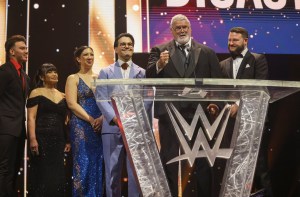East New York is currently the No. 2 new series across all networks. After just premiering in Oct. 2022, the series recently received a pick-up for a full season. Tony Award winner Ruben Santiago-Hudson stars as veteran Marvin Sandeford, a highly respected training officer and expert on the neighborhood. Fellow Tony Award nominee Elizabeth Rodriguez plays passionate Detective Crystal Morales. They both journey collectively and individually as they try and navigate lives as members of the NYPD.
From executive producers of NYPD Blue, the series stars Amanda Warren as Deputy Inspector Regina Haywood, the newly promoted boss of the 74th Precinct in East New York – a working-class neighborhood on the edge of Brooklyn in the midst of social upheaval and the early seeds of gentrification. With family ties to the area, she is determined to deploy creative methods to protect her beloved community with the help of her officers and detectives. But first, she has the daunting task of getting them on board, as some are skeptical of her promotion, and others resist the changes she is desperate to make.
Videos by PopCulture.com
With news of a full-season order, PopCulture.com spoke with Hudson and Rodriguez about all they are excited to explore in the remainder of the season. The Broadway vets also dished about the differences between the two worlds of stage and television. The series airs every Sunday night on CBS. Watch the full video interview above.
PC: Congratulations on getting a full series pickup, that is amazing. The show is amazing, and you guys are doing such a great job. So I’ll start with you, Ruben. What about the show do you feel has made it such a success to get the full series pickup so early in the game?
RH: The combination of the ingredients that made this wonderful gumbo, made it so delicious. It’s the actors, it’s the writing, it’s the crew, it’s the time slot they gave us, it’s support that CBS has given us. It’s all these things have to come together, and if they hit it at the right time, you have a hit. And fortunately for us, we have not stumbled upon, but worked our tails off to create something that people want to see every week. And I feel grateful and blessed to be a part of it.
PC: Now for you, Elizabeth, now that you guys do have the full order, what are you most excited for viewers to see as the show progresses within the characters and as well as the storylines?
ES: I’m excited for viewers to get to know us, each character, more individually. The personal , more sides of us, because we’re all so dynamic as human beings in the world. The more that the viewers get to see and have opportunities to know more about us personally, the more they’ll connect. The more you learn more about people, the more every single person connects, because you can see yourself or someone in those people. And absolutely having more important stories to tell. I’m excited about all of it. I’m excited. I want it to go on and on.
PC: Now that both of you have done extensive work in Broadway. What would you say are the challenges and the differences between the two worlds individually, in your cases?
RS: Well, television, you have to just, it’s instant. Things happen very fast in TV. In theater, we have a process. We have time to develop things and make things important that weren’t important to us when we woke up that morning. In theater, because you’re in a process, a three week, three and a half week rehearsal, the individual across from you becomes important to you. They’re part of something that’s your everyday life. You spend more time in rehearsals than you do with your spouse. In TV, normally that isn’t the case. With this group, because it’s a lot of theater actors in it, we come with that sort of process, of work ethic. And I think it rings true in what we deliver every week, that we can connect to each other in a deeper way and not a superficial way.
ES: I agree. I also think that you have to trust what’s not there on the page or what’s going to come, and so you’re working from instincts in TV a lot. And when you have seasoned actors, you can trust that they’re going to work the same way. A lot of times, people can also show up with egos and we happen to be so blessed to not have that. Everyone that we are working with’s intention is to serve the story and their character. So there’s not a lot of extra – there’s no just wasted fluff of air and energy that you have to navigate through. And that is amazing.
PC: Which audience would you say is the most critical?
ES: I don’t know. Maybe, I would think that the most critical would have to be people that are from Brooklyn. From…I just mean…Oh, you mean between TV-
PC: Between theater and TV.
ES: Oh, I was thinking people that are from East New York, and they happen to love it. But which audience is more critical? I think theater, definitely. They have an expectation of what they’re going to see. If it’s a straight play, they might have seen a different production of it, different than musicals. So I feel like… I know I am…even with people that are friends of mine that are in something, I’m like, “That was really good. But they missed that moment.” It’s ridiculous. I’d be like, “Oh that was…” It’s moment-to-moment-to-moment. And you’re experiencing it in real time, so it’s alive in your body differently. So I think theater audiences are more critical. You, Ruben?
RS: Well, it’s just the masses of it. Every week we got 10 million critics when we do our show, East New York. And in theater, you’re lucky if you’ve got 900 critics that night. So we get 10 million critics that night. So the one to me is no less critical than the other, depending on who the individual is and how anal they are. But the masses of critics that we get every week, I mean people in the gym want to be critics, when I go to the gym to work out, when I’m on the bus, people want to be a critic – on the train, walking down the street – because 10 million people just witnessed the work that took us eight days to put together and handed to you 48 minutes, 42 minutes. And now you want to be critical of what we didn’t have and what we did have. In theater, it’s a little different. But it’s just how big the critics are on TV.
Most Viewed
-

US television personality Kylie Jenner arrives for the Wall Street Journal Magazine 2023 Innovator Awards at the Museum of Modern Art in New York City on November 1, 2023. The annual awards, now in their 12th year, recognize talents from a range of disciplines, including fashion, art, literature, entertainment, architecture, design, technology, and philanthropy. (Photo by Andrea RENAULT / AFP) (Photo by ANDREA RENAULT/AFP via Getty Images)







